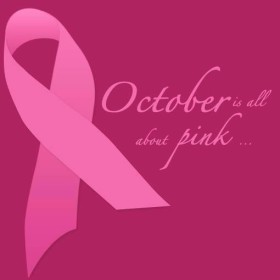 With news of a second case of Ebola developing in the United States, fears about our health have catapulted to the top of an ever-growing list of anxieties. Yet, as we implement an improved means for controlling the spread of that disease, we can turn the focus to our current abilities to influence the course of other diseases.
With news of a second case of Ebola developing in the United States, fears about our health have catapulted to the top of an ever-growing list of anxieties. Yet, as we implement an improved means for controlling the spread of that disease, we can turn the focus to our current abilities to influence the course of other diseases.
During the month of October we are reminded of the power we have to manage breast cancer – through awareness, risk reduction, early detection, effective medical treatment, support and finding positive meaning. While 1 in 8 American women will be diagnosed with breast cancer sometime in her life, the vast majority of them—close to 3 million today—survive and thrive.
If you, or a friend or family member, are fighting breast cancer, here are some things to keep in mind:
Awareness. After skin cancer, breast cancer is the most common one among American women. Ever since the inception of National Breast Cancer Awareness Month almost 30 years ago, pink ribbons and colors pop up all over—including on the uniforms of NFL teams—during the month of October.
Risk Reduction. A study supported by the American Cancer Society found that postmenopausal women who walk at least an average of one hour a day have a reduced risk of developing breast cancer compared to those not as physically active. Practicing a healthy lifestyle by limiting alcohol, not smoking and controlling your weight have also been linked to a lower incidence.
Early Detection. Having a regular screening mammogram and visiting your physician for a breast exam can identify certain cancers while they are still in the early stages. Performing monthly breast self-exams and consulting with your doctor about including additional diagnostic tools such as ultrasounds and MRI studies may aid in discovering small cancers.
Effective Medical Treatment. Traditional treatment for breast cancer, depending on its stage and grade, has included surgery, radiation, chemotherapy and hormone therapy. More individualized therapy may involve targeted drugs based on gene-expression profiles, immunotherapy, or prophylactic mastectomy and reconstructive surgery.
Support. Family and friends can help if you let them know what you need. Don’t be afraid to ask. Breast cancer support groups provide information, feedback, encouragement and comfort. And don’t forget to support yourself: give yourself credit for the challenges you’ve faced.
Meaning. Survivors of breast cancer often develop a deeper appreciation of the wonders of life. Women who take control and make something positive come out of such a negative experience become more confident and optimistic about the future.
Pink ribbons everywhere this month remind us all to be aware of Breast Cancer—it’s up to you to carry that message forward every month of the year. And best wishes for your good health.









